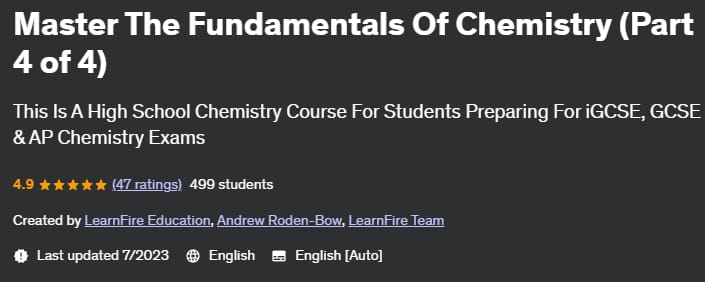Description
Master The Fundamentals Of Chemistry (Part 4 of 4), the fundamentals of chemistry part 4 course is published by Udemy Academy. This course gives them the skills to feel confident for their exams. Buy this course to help your student prepare for their exams by helping them understand chemistry, rather than focusing on trying to memorize seemingly unrelated material. This course covers all the material studied in iGCSE Chemistry and GCSE Chemistry courses in organic chemistry, reaction rates, equilibrium and redox reactions. These are usually the subjects covered in (i) GCSE courses by schools in Year 11 (Year 10, ages 15/16); This material is also relevant for most GCSE courses. It is designed for students who are currently in Year 11 (grade 10, ages 15-16) and are reviewing material covered in their school lessons.
It will also be useful for those students entering A Level Chemistry or IBDP courses who need a solid foundation before embarking on these more advanced qualifications. The material discussed in this topic is also covered in most American and Canadian 10th grade chemistry/science curricula (ages 15/16). This IGCSE (O Level) Chemistry class is offered by IGCSEprep on Udemy. This masterclass covers all the content needed to write the IGCSE Chemistry exams offered by Pearson Edexcel (double or triple) or Cambridge CIE (core or advanced) or other exam boards such as Oxford AQA.
What you will learn
- In this course, students learn exactly what they need to know for their chemistry exams so that they can pass the exams in the best way possible.
- Calculate the percentage of return
- Understand why covalent materials do not conduct electricity
- Understand why ionic substances conduct electricity in melt or water
- Use the terms cation and anion for charged particles
- Describe electrolysis experiments and predict the observations made at the anode and cathode
- Write ionic half-equations for the reactions that occur at the anode and cathode during electrolysis
- Know that metals are extracted from compounds found in the Earth’s crust, and inactive metals are often found as uncombined elements.
- Learn how a metal’s position in the reactivity series is related to the method used for extraction
- Comment on the appropriate extraction method for a metal given its reactivity information
- Explain the use of metals related to their properties
- Describe experiments to investigate factors that affect the rate of a chemical reaction
Who is this course suitable for?
- iGCSE and GCSE students studying double (core) or triple (extended) chemistry or courses for a similar age range.
Details of the Master The Fundamentals Of Chemistry course (Part 4 of 4)
Chapters of Master The Fundamentals Of Chemistry (Part 4 of 4)
Course prerequisites
- Parents of students currently studying Chemistry at GCSE level or similar courses for the same age range. Completion of parts 1-3 of this course series is highly recommended.
Pictures

Sample video
Installation guide
After Extract, view with your favorite Player.
English subtitle
Quality: 720p
download link
File(s) password: www.downloadly.ir
Size
5.52 GB